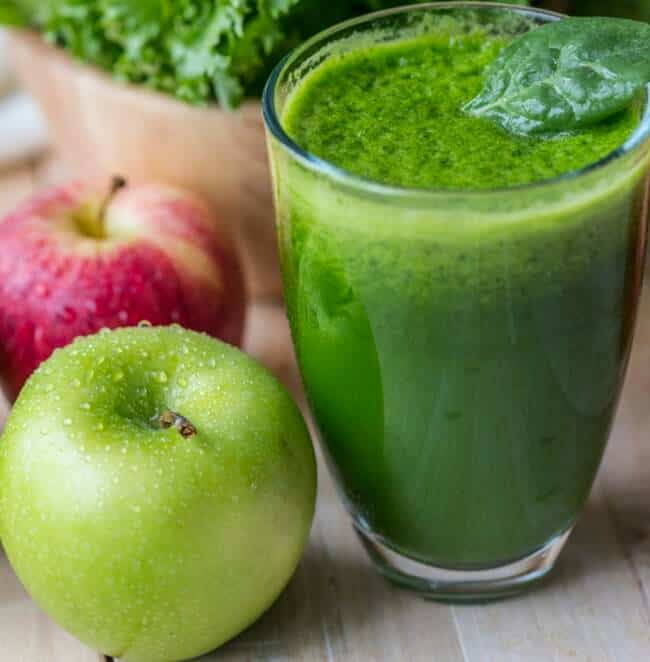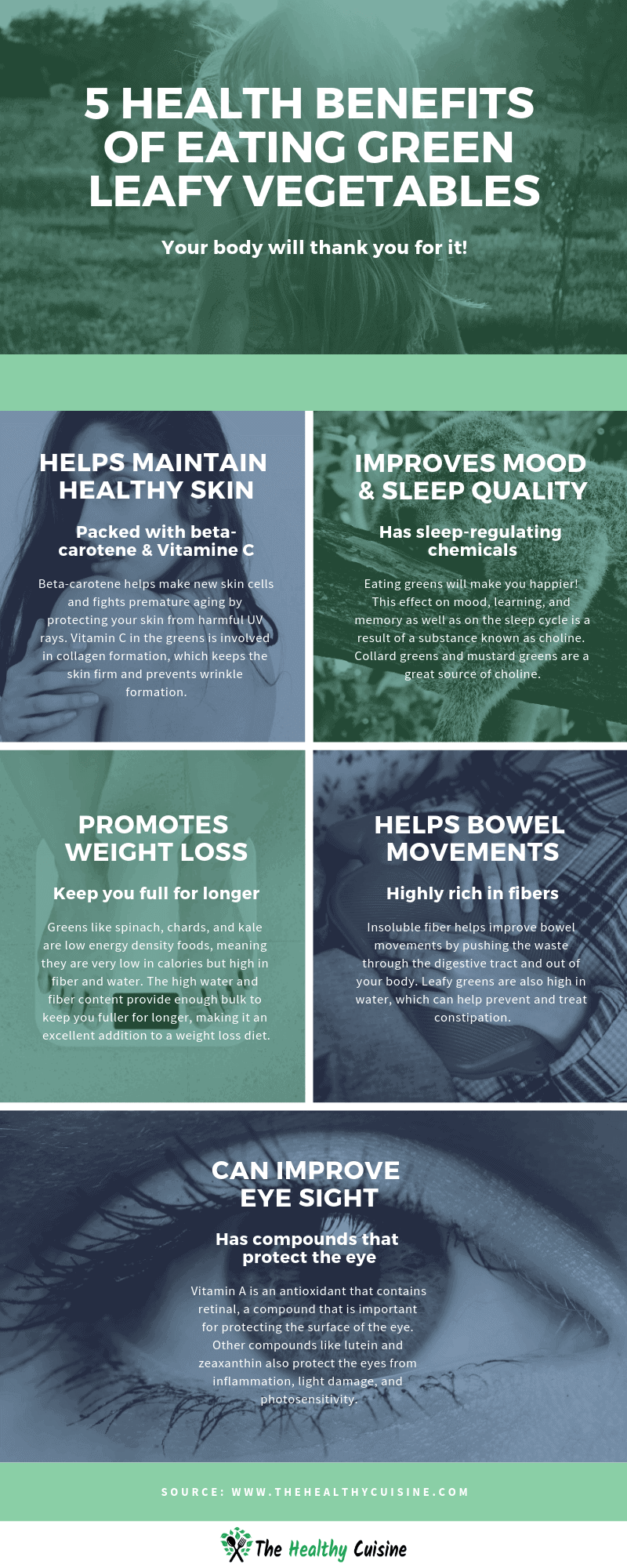I haven’t always been a fan of dark leafy greens, but they are now an important part of my diet. I use them in salads, soups, and breakfast recipes. I even blend some of them in my energizing breakfast smoothies, juices now and then. They became a regular part of my menu when I realized just how healthy they were.
I first heard about the health benefits of green leafy vegetables when I was studying nutrition in 2013. I was amazed to discover that they are so incredibly rich in antioxidants, essential vitamins, minerals, and phytonutrients – all of which can offer numerous health benefits, including reduced risk of cardiovascular diseases (1), obesity and mental decline (2).
Now, when I say leafy green vegetables, I mean all the really dark greens such as spinach, kale, arugula, and collard greens. While it’s true that lighter greens like iceberg lettuce are high in water and fiber, they don’t quite pack the same nutritional punch as the dark greens do.
Let’s take a look at some of the amazing health benefits of green vegetables.
- #1 Rich in Micronutrients
- #2 Help Improve Bowel Movements
- #3 They Can improve Mood and Sleep Quality
- #4 They pack an antioxidant punch
- #5 Help maintain a healthy skin
- #6 May help prevent and treat anemia
- #7 Can help with weight loss
- #8 Can Improve eyesight
- Dietary recommendations
- How to use green leafy vegetables
- Health Benefits Of Eating Leafy Green Vegetables Infographic
#1 Rich in Micronutrients
Dark leafy greens are powerful superfoods filled with vitamins, minerals, and phytonutrients. They are rich in antioxidant vitamins C, E, and beta-carotene (a precursor of vitamin A) that protect our cells and play an important role in preventing cancer (3). They are also rich in folate, a B vitamin that promotes heart health (4) and helps prevent birth defects (5) and vitamin K, which may provide benefits for bone health (6).
Dark leafy vegetables contain lots of fiber and minerals like iron, magnesium, calcium, and potassium, which all have a role in our body. They are also low in cholesterol, sodium, and carbohydrates (7).
Note that just like each leafy vegetable has its own texture and unique flavor profile, the nutritional value can also vary from plant to plant. Check out this handy leafy greens nutrition chart for more information.
#2 Help Improve Bowel Movements

One of the most important benefits of leafy greens is their abundance of insoluble fibers.
While it may sound like it’s something too difficult for your body to digest, insoluble fiber actually helps improve bowel movements (8) by pushing the waste through the digestive tract and out of your body.
Leafy greens are also high in water, which can help prevent and treat constipation.
#3 They Can improve Mood and Sleep Quality
Who would have thought that eating your greens will literally make you happier? This effect on cognitive functions like mood and memory as well as on the sleep cycle is as a result of a substance known as choline.
Choline is a micronutrient that has lots of different roles in our body. It acts as a precursor to acetylcholine, a neurotransmitter that helps with mood, learning and memory functions (9). On top of that, choline is essential for normal brain development as well as normal liver and nerve function. It helps support our energy levels and maintain a healthy metabolism. Collard greens and mustard greens are a great source of choline (10).
#4 They pack an antioxidant punch

Besides the antioxidant vitamins C, E, and provitamin beta-carotene, green leafy vegetables also contain compounds with antioxidant effects.
For example, one of the many health benefits of kale and spinach comes from their high content of plant pigments lutein and zeaxanthin, which both have antioxidant properties. Lutein and zeaxanthin are carotenoids, that may help prevent strokes, cardiovascular diseases (11), certain types of cancer (12) and lower the risk of age-related eye diseases in older age (13).
#5 Help maintain a healthy skin
These nutritional powerhouses will not only help make you feel good but also look good. Yes, the health benefits of eating kale and other greens actually include glowing skin!
Dark leafy vegetables are packed with beta-carotene, that helps your skin shed old skin cells and make new ones, promoting that fresh, youthful glow. β-carotene is also responsible for protecting your skin from harmful UV rays (14), fighting premature aging (15). Vitamin C helps defend your skin against damage from free radicals, but it’s also involved in collagen formation which keeps the skin firm (16) and prevents wrinkle formation (17).
#6 May help prevent and treat anemia
For a long time, doctors have recommended green leafy veggies alongside medication for treatment of anemia. This is because many of them including kale, spinach, collard greens, and chard are rich in iron and vitamin C.
Both of these nutrients play an important role in preventing and treating anemia: iron is involved in the natural process of making red blood cells (18), and vitamin C helps your stomach absorb iron (19).
However, there’s a catch. Some iron-rich leafy greens such as spinach and kale are also high in oxalates, compounds that prevent the absorption of plant-based iron. You don’t have to give up these yummy leaves completely though. You can easily reduce the oxalic acid content by steaming or wilting the leaves (20) for five to eight minutes before using them in your favorite recipes.
#7 Can help with weight loss

Contrary to popular belief, leafy greens do not have direct fat-burning effects. That is not to say they are not weight loss-friendly foods, however.
Greens like spinach, chards, and kale have a low energy density, meaning they are very low in calories but high in fiber, water, and nutrients. The high water and fiber content provide enough bulk to keep you fuller for longer, making it an excellent addition to a weight loss diet.
#8 Can Improve eyesight
Finally, most of these veggies are rich in vitamin A including kale, spinach, and arugula. Vitamin A is an antioxidant that contains retinal, a compound that is important for protecting the surface of the eye (21). Lutein and zeaxanthin that I mentioned above also protect the eye from inflammation, light damage, and photosensitivity (22).
Dietary recommendations
Highly nutritious leafy vegetables like collard and beet greens, arugula, spinach, and kale make a smart and necessary addition to your diet. As you can see from the list above, they contribute to your health in many ways and can even prevent chronic illnesses.
The U.S. Department of Agriculture recommends you should eat at least 1½ to 2 cups of dark leafy veggies per week. One serving of greens is 1 cup raw or ½ cup cooked veggies (23).
It’s best to have variety in your diet by mixing up your greens as overconsuming one particular type could have unwanted side effects. For example, the oxalates in some green veggies block calcium absorption (24), which could lead to all sorts of health problems if consumed in excess.
How to use green leafy vegetables
Green leafy vegetables taste great in salads, wraps, soups, veggie omelets, stir-fries, juices (make sur to get a good masticating juicer) and they make a delicious side dish for any main meal.
Try out some of my favorite leafy green veggie recipes:
- Spinach shakshuka by Epicurious
- Greek kale salad with lemon olive oil dressing by Gimme Delicious
- Detox spinach green smoothie by Vibrant Plate
- The Green Juice by Eating Bird Food
FAQs About The Health Benefits Of Eating Leafy Green
What are Green Leafy Vegetables Rich In?
Green leafy vegetables are a powerhouse of nutrients. They are rich in dietary fiber, vitamins (A, C, K), minerals (iron, calcium, potassium), and antioxidants that help in maintaining good health and well-being.
What is the Healthiest Green Leafy Vegetable?
While all green leafy vegetables offer incredible health benefits, kale stands out as the healthiest. It contains high amounts of vitamins, minerals, and antioxidants, and contributes positively to heart and bone health. Including kale in your diet is a superb choice for enhancing overall health.
Is it Good to Eat Leafy Greens Every Day?
Yes, eating leafy greens every day is excellent for your health! They’re packed with essential nutrients like fiber, vitamins A, C, and K, and antioxidants. Including them in your daily diet can boost your immune system, improve digestion, and reduce the risk of chronic diseases.
Health Benefits Of Eating Leafy Green Vegetables Infographic

Copy The Code Below To Share This Infographic On Your Site





